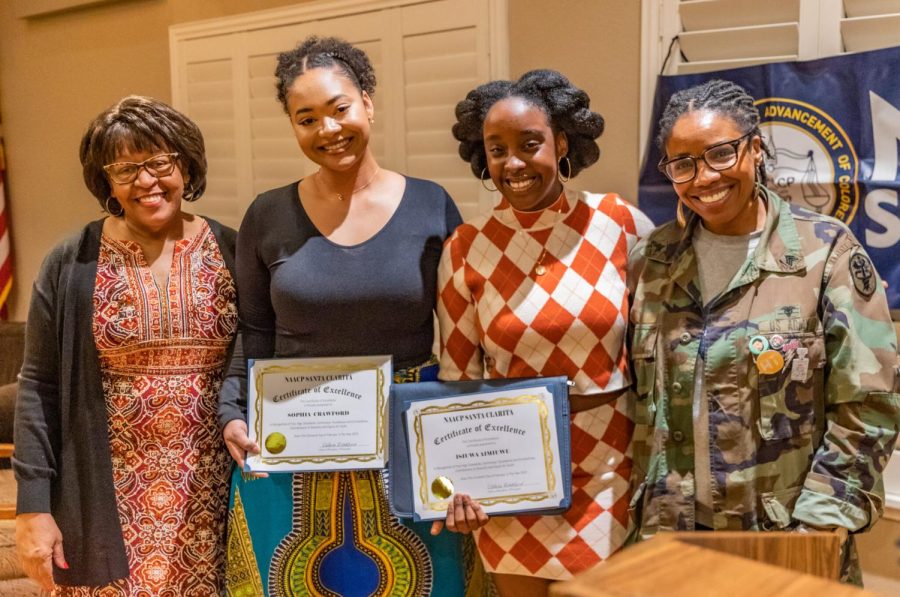Two Students Receive Certificate of Excellence from NAACP
February 28, 2023
Two Castaic High School Seniors received a Certificate of Excellence from the SCV chapter of the National Association for the Advancement of Colored People (NAACP) during a meeting on Thursday, Feb 16. Isiuwa Aimiuwu, current ASB President, and Sophia Crawford, this year’s Homecoming Queen, accepted their awards during the event intended for community members to celebrate Black History Month.
“I was not expecting to be given an award after I had delivered my speech!” Aimiuwu explained. “When my name was called and I was handed the Certificate of Excellence, I was overcome with joy.”
In addition to the title of ASB President, Aimiuwu is also the founder and president of the Black Student Union and Alliance (BSUA).
“To me, the certificate represents the accomplishments that I have done throughout my four years at Castaic High School,” Aimiwuw said. “This NAACP event will be a memory I’ll always remember, full of pride.”
Homecoming Queen Sophia Crawford, is also Captain of the softball team and treasurer, as well as a founding member, of BSUA.
“It makes me feel as if I am becoming a voice for the Black people in SCV,” said Crawford. “And that I’m shaping my very own Black history. ”
Known by their peers as confident and kind, there is no doubt these two seniors deserved this prestigious recognition. Aimiuwu and Crawford both accepted their awards with articulate and compelling speeches emphasizing the significant contributions Black Americans have made to this country.
Crawford presented a poem, penned by her, about the importance of Black History and what it means to her. Titled “I am not a Minority” Crawford’s poem intended to capture “the rhythmic and soulful language that is brought to life by our people such as Amanda Gorman, Maya Angelou, and Langston Hughes.” There is no doubt that her words did that. Here is an excerpt of her poem:
I am not a minority.
Minority?
the smaller part,
that is less than half the
whole.
I am more than just a minority.
A small number that makes me different from the majority?
Or should I say priority?
That’s what they want us to think.
I am not a minority.
My history has proven that.
Martin has taught me to dream.
Malcolm taught me to question the regime.
Maya taught me to write.
Rosa has taught me to fight.
Robinson has taught me how to play ball.
But not a single one has told me that I am small.
To read Crawford’s full poem, visit this page.
Aimiuwu presented a speech where she highlighted important Black figures, including her grandfather, who was the first Black man to earn a doctorate in physics from Kent State University. In her eloquent and substantive speech, Aimiuwu pointed out an uncomfortable truth about education in America when it comes to Black history.
“The history of Black people in America is as the country itself, despite obstacles and discrimination and systemic oppression, our contributions are vast, in fact, pivotal to the political and economic sense of the United States,” said Aimiuwu. “Although we are integral to the history of this country, too often our story is limited in scope and depth. As school children we learned the same partial, comfortable truths about the same key figures year after year.”
Black History Month started as “Negro History Week” with the Association for the Study of Negro Life and History declaring the second week of Feburary to be a time to recognize the African American contributions to the United States. In 1976, President Gerald Ford converted this week-long remembrance into an entire month dedicated to “honor[ing] the too-often neglected accomplishments of Black Americans in every area of endeavor throughout our history.” American Citizens have celebrated Black History Month every February since.
“I believe the best way to celebrate Black History Month is to learn about new figures in history who have impacted the world and the people in it,” says Aimiwuw. “There are so many unsung Black heroes who are overlooked who deserve recognition for the amazing work they have done.”
As for Crawford, she personally celebrates Black History Month by embracing her heritage.
“I celebrate by preaching my history, upholding my culture, and remembering the ancestors that have battled so hard for my prosperity,” said Crawford.
Not only is Black History Month a time to recognize the achievements and contributions of Black people in this country, it also functions as a time to reflect on the current struggles facing POC and the work that must still be done. February calls to action people who are not typically involved with or educated about the Black Experience: seek out knowledge and support this community. There are many feasible ways to do this.
Ultimately, many Americans do not understand the daily challenges of existing as a person with a darker skin color. Denial and ignorance feed into the cycle of discrimination and hate.
“I wish that people would acknowledge the fact that there are many barriers that the Black community has to face on a regular basis,” said Aimiwuw. “It’s important that we have allies to help us break down these barriers so that we can have the same advantages as our counterparts.”
Crawford summarized it best, “Black history is still being made,” she said. So it’s important to stay educated.
Take the time (whether it’s the month of February or not) to learn something new and celebrate the powerful and enduring Black figures who got us here. Take a look around, they might even be students at your own high school.
Congratulations Sophia Crawford and Isiuwa Aimiwuw!




Melanie Paulsen • Mar 2, 2023 at 8:15 am
Great article celebrating some of our CHS super stars!